
Sapardi Djoko Damono was an Indonesian poet known for lyrical poems, and who was widely regarded as the pioneer of lyrical poetry in Indonesia. He died in South Tangerang, Banten on 19 July 2020 after a long illness.

Goenawan Mohamad is an Indonesian poet, essayist, playwright and editor. He is the founder and editor of the Indonesian magazine Tempo. Mohamad is a vocal critic of the Indonesian government, and his magazine was periodically shut down due to its criticisms.
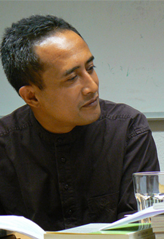
Agus R. Sarjono is an Indonesian poet and author. In 1988, he graduated from Department of Indonesian Literature of IKIP Bandung, and then finished his postgraduate program in Universitas Indonesia at the faculty of literature and cultural studies in 2002.
Ahmadun Yosi Herfanda, is an Indonesian journalist and poet. His name is also written as Ahmadun YH, Ahmadun Y. Herfanda, Ahmadun Herfanda, or AYH (ayeha). Ahmadun's poetry focuses on social and religious themes and is informed by Sufism. He is a reporter and arts editor at the daily newspaper Republika. Now he is known as a famous Indonesian poet and writer.

Indonesian literature is a term grouping various genres of South-East Asian literature.
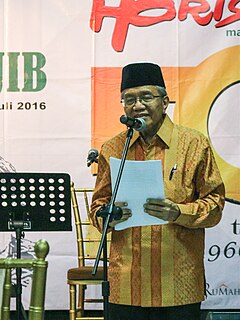
Taufiq Ismail is an Indonesian poet, activist and the editor of the monthly literary magazine Horison. Ismail figured prominently in Indonesian literature of the post-Sukarno period and is considered one of the pioneers of the "Generation of '66". He completed his education at the University of Indonesia. Before becoming active as a writer, he taught at the Institut Pertanian Bogor. In 1963, he signed the "Cultural Manifesto" as a document that opposed linking art to politics. This cost him his teaching position at the Institut.
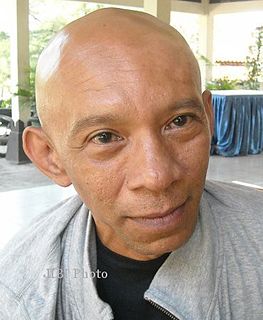
Afrizal Malna, is an Indonesian activist, writer of prose, poetry, and theatrical texts.

Hans Bague Jassin, better known as HB Jassin, was an Indonesian literary critic, documentarian, and professor. Born in Gorontalo to a bibliophilic petroleum company employee, Jassin began reading while still in elementary school, later writing published reviews before finishing high school. After a while working in the Gorontalo regent's office, he moved to Jakarta where he worked at the state publisher Balai Pustaka. After leaving the publisher, he attended the University of Indonesia and later Yale. Returning to Indonesia to be a teacher, he also headed Sastra magazine. Horison, a literary magazine, was started in July 1966 by Jassin and Mochtar Lubis as a successor to Sastra, and was edited by Taufiq Ismail, Ds. Muljanto, Zaini, Su Hok Djin, and Goenawan Mohamad. In 1971, Jassin was given a one-year prison sentence and a two-year probation period because as the editor of Sastra, he refused to reveal the identity of an anonymous writer who wrote a story which was considered by the court to be blasphemous.

Ajip Rosidi was an Indonesian poet and short story writer. As of 1983 he had published 326 works in 22 different magazines.

Christophorus Apolinaris Eka Budianta Martoredjo, also known as C. A. Eka Budianta, more commonly known as Eka Budianta is an Indonesian poet. He was born into a Catholic family and was the second child of nine. His grandparents were farmers. His parents were public elementary school teachers. His father later worked at the local office for the Ministry Education and his mother became a school principal. After graduating from St. Albertus high school in Malang (Dempo), he attended the Lembaga Pendidikan Kesenian Jakarta, now known as Institut Kesenian Jakarta but did not complete his studies. From 1975 to 1979, Eka Budianta studied Japanese literature at the Department of East Asian Studies Literature then changed to the Department of History, Faculty of Letters, University of Indonesia. He then studied journalism at Los Angeles Trade-Technical College in the United States from 1980–81.
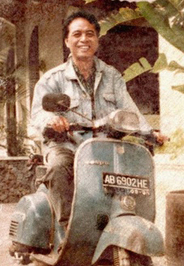
Linus Suryadi Agustinus, commonly known Linus Suryadi AG or Linus Suryadi AGN was born in Sleman, Indonesia on 3 March 1951 and died in Yogyakarta on 30 July 1999 at the age of 48.

Toeti Heraty was an Indonesian poet. She has been singled out as the "only woman amongst the leading contemporary Indonesian poets".

Tengku Amir Hamzah was an Indonesian poet and National Hero of Indonesia. Born into a Malay aristocratic family in the Sultanate of Langkat in North Sumatra, he was educated in both Sumatra and Java. While attending senior high school in Surakarta around 1930, Amir became involved with the nationalist movement and fell in love with a Javanese schoolmate, Ilik Sundari. Even after Amir continued his studies in legal school in Batavia the two remained close, only separating in 1937 when Amir was recalled to Sumatra to marry the sultan's daughter and take on responsibilities of the court. Though unhappy with his marriage, he fulfilled his courtly duties. After Indonesia proclaimed its independence in 1945, he served as the government's representative in Langkat. The following year he was killed in a social revolution led by the PESINDO, and buried in a mass grave.
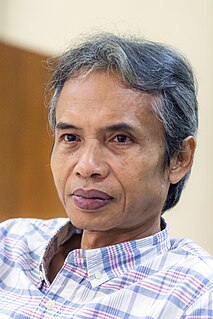
Joko Pinurbo is an Indonesian poet. His poetry is a mixture of narrative, irony, and self-reflection.

Korrie Layun Rampan was an Indonesian novelist, short story writer, poet, literary critic, journalist, and politician.

Upuh Ulen-Ulen, also known as kerawang gayo, is a traditional cloth of the Gayonese people in Aceh, Indonesia.

Deknong Kemalawati is one of the leading poetess of modern Indonesia, chairman of the Art Council Banda Aceh, winner of the Literary Prize of the Government of Aceh.
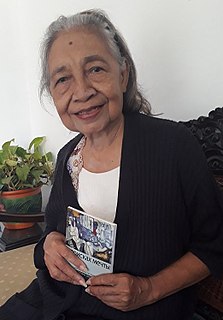
Diah Hadaning was an Indonesian writer. Among friends she is known as Diha.

Dimas Arika Mihardja was an Indonesian poet and scholar, essayist. He wrote under a pseudonym, the real name is Sudaryono. Among friends he was called as Dam.

Tan Lioe Ie is an Indonesian poet, the first poet in Indonesia who uses Chinese symbolic images in his poetry. Among friends he is called as Yokie.



















